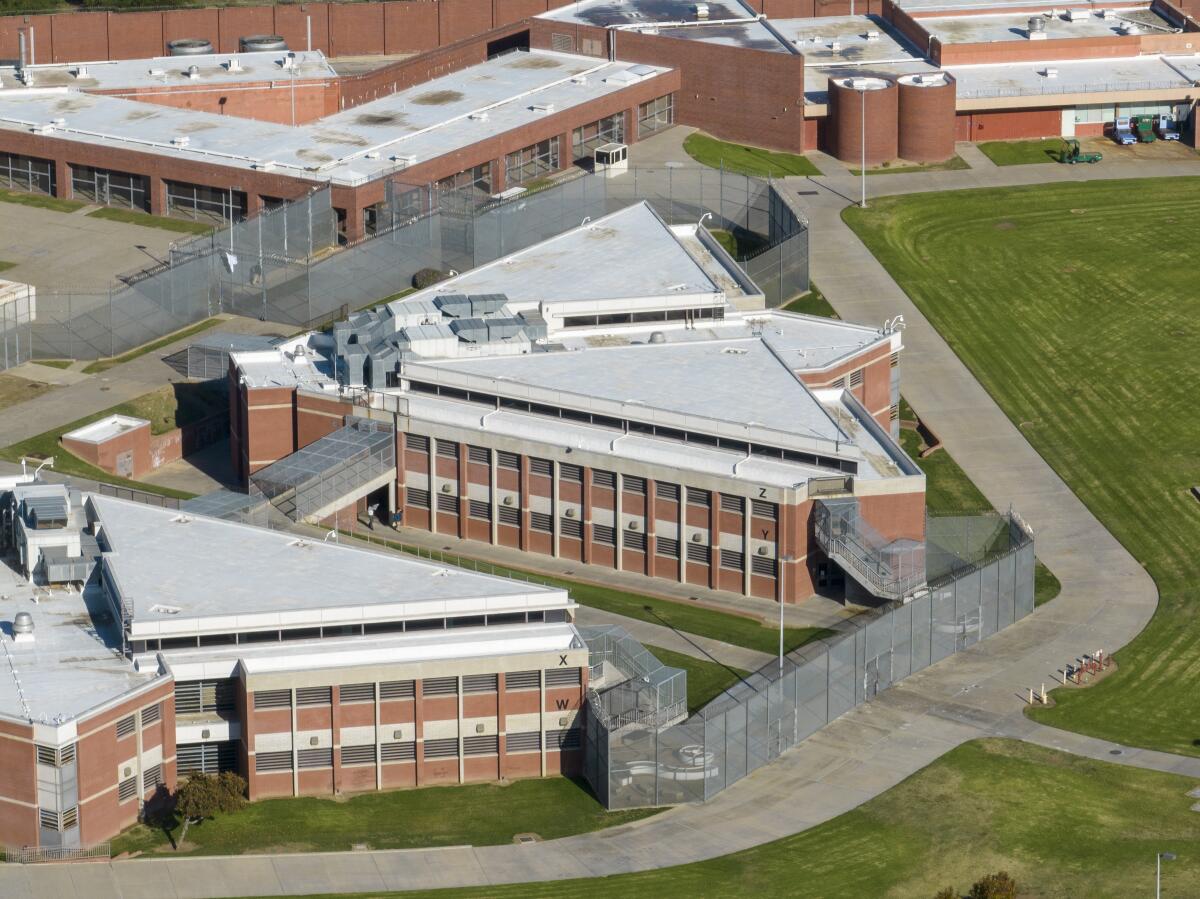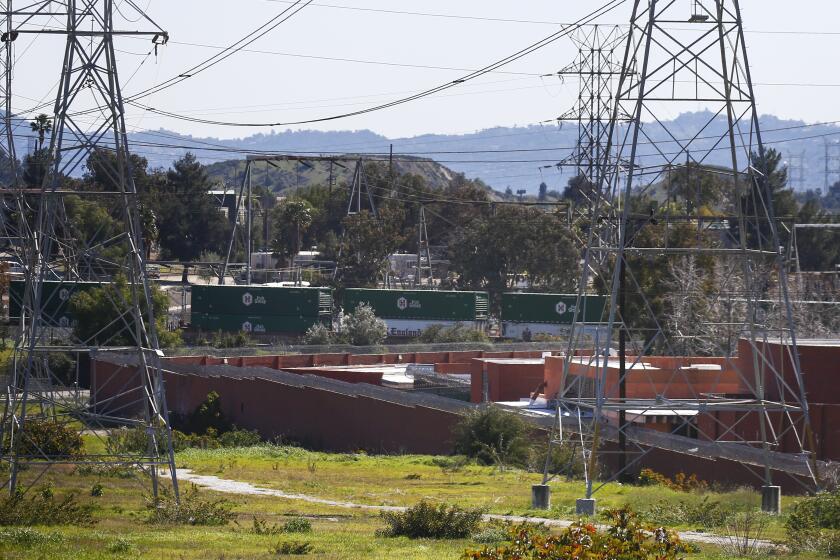State regulators give L.A. County more time to fix dysfunctional juvenile halls

- Share via
State regulators on Thursday put off a shutdown of Los Angeles County’s two dysfunctional juvenile halls, angering youth advocates who accused the state agency of shirking its responsibility to shutter facilities that have clearly failed.
The move gives the county extra time to carry out a turnaround of its juvenile halls so dramatic that even state regulators appeared skeptical they could pull it off.
“I struggle trusting L.A. County going forward,” Linda Penner, chair of the California Board of State and Community Corrections, or BSCC, said at a meeting in Sacramento after county officials had finished detailing planned improvements at the facilities. “You’re talking about a long-range, futuristic plan about how to get staff on board. But I’m concerned [about] your staff today. I’m concerned what’s going to happen overnight tonight.
“Your execution has failed these young people in your care and custody repeatedly,” she said.
But despite the strong rebuke, none of the board members appeared ready to shutter the troubled facilities, a move that county officials warned would destabilize the nation’s largest juvenile justice system.
Instead, the board voted unanimously to reassess whether the facilities were suitable for juveniles at a future meeting in mid-May.
Since 2021, the state board has repeatedly found Barry J. Nidorf Juvenile Hall in Sylmar and Central Juvenile Hall in Boyle Heights out of compliance with a laundry list of state regulations. Each time, the Probation Department has been given a chance to fix the problems and narrowly averted a shutdown.
But the conditions at the facilities have continued to deteriorate, while incidents of violence and overdoses have risen. An acute staffing crisis has meant the facilities often don’t have enough officers on hand to let youths out of their rooms. A recent inspection found people urinating in their rooms because no one on the night shift was coming to let them out.
Do you know who your L.A. County supervisor is? Do you know how to get her attention? Use Shape Your L.A. to get active in your community.
Frustrated with the worsening conditions, state regulators signaled last month they were prepared to take the unprecedented step of shutting the two halls down.
In a letter to interim Chief Probation Officer Karen Fletcher, state regulators said the most recent “corrective action plan” the department submitted to address the facilities’ problems was not good enough. The board warned it would take a vote in three weeks on whether to close the facilities, which would give county officials two months to find new places to house the roughly 350 youths in their care.
The threat left the county scrambling. On April 3, officials submitted a revised plan to the board detailing how they would assuage regulators’ concerns. Changes included reassigning 100 field deputy probation officers to the halls, offering bonuses to all staff and searching for stronger, shatter-resistant glass to fix roughly 81 broken windows.
A string of top county officials implored regulators Thursday to give the county a little more time to see the improvements through.
Chief Executive Fesia Davenport called the amended plan the most “comprehensive” ever provided to regulators. Fletcher, the interim probation chief, told the agency they were making “great strides” in some of the problem areas. County Supervisor Janice Hahn promised they were mounting an “all-hands response” and vowed conditions were improving.
“We ask that you work with us to build on those results, rather than taking the drastic action of shutting down our juvenile halls,” she said. “Ultimately, it will be the young people in our facilities who would suffer the most.”
The changes were enough to hold off regulators for now. The motion the BSCC voted on to defer a decision on the shutdown noted the county was moving “proactively” to make improvements, including hiring “new key personnel.”
The county supervisors voted last week to hire Guillermo Viera Rosa, the head of California’s adult parole division and a former BSCC member, to fill a newly created position: chief strategist for juvenile operations. He was hired at an annual salary of $320,000 — about $16,000 less than what former probation chief Adolfo Gonzales was hired at two years ago. Gonzales was fired in March, which county leaders promised would be the first step in a fundamental overhaul of the troubled department.
Supervisor Kathryn Barger said in an interview that Viera Rosa would report directly to the Board of Supervisors, a way for the county’s leaders to keep closer tabs on what was unfolding within the department’s camps and halls.
“That’s really the difference is that we’re bringing someone in with a new set of eyes,” she said.
Some legal advocates argued the delay was more than a shirking of responsibility, but a violation of state law.
Sean Garcia-Leys, co-executive director of the Peace and Justice Law Center and a member of L.A. County’s Probation Oversight Commission, said that Welfare and Institutions Code 209 made it clear that because the county did not file an approved corrective action plan in time, regulators had no choice but to formally find the facilities “unsuitable” for youths.
Such a finding, he said, would give the department a hard two-month deadline to either dramatically improve the facilities or remove all the youths.
“It just became glaringly obvious to me that there is a statutory duty at this point, to do the 60-day notice of ‘Get the kids out of there or come into compliance,’” Garcia-Leys said in an interview, adding that he was not speaking on behalf of the county oversight group. “And the board is not doing it.”
In a letter Wednesday to the chair of the BSCC, Garcia-Leys and Erin Palacios, a staff attorney with the Youth Law Center, said that if state regulators did not find the facilities unsuitable at their meeting Thursday, they would consider suing the board.
“The law does not permit this delay,” the two attorneys wrote.
The board did not mention the threat of legal action during the meeting.
Although state regulators indicated they saw signs of improvement within the facilities, from the outside, little appears to have changed.
The county’s Office of Inspector General released a report Friday that found that the entry points for contraband within the two facilities were rampant.
The report repeated common allegations from probation officials that drugs are being ferried into the halls via drone, hurled over walls by associates of detained youths or delivered by friends disguised as DoorDash workers, who, at least once, dropped off pills wrapped inside a burrito.
The drug overdose issue within the facilities has become so serious that a Superior Court judge last month asked Gonzales to appear at a court hearing focusing on a pair of youths who recently transferred back to L.A. County from the state Division of Juvenile Justice. They overdosed on fentanyl not long after being placed back in the Probation Department’s custody and had to be revived with Narcan, which helps reverse an opioid overdose.
A probation officer was seriously injured when stabbed in the face by a youth inside Barry J. Nidorf Juvenile Hall in Sylmar. The attack comes just days before a state board could vote to shutter the long-troubled facility.
During the hearing, Alternate Public Defender Angeles Zaragoza said the overdoses were related to fentanyl-laced Percocet pills that had been smuggled into the Secure Youth Track Facility inside Nidorf, which houses juveniles accused of serious crimes, including murder.
L.A. Superior Court Judge Miguel Espinoza also noted that more officers needed to be trained in the use of Narcan, suggesting it was a “stroke of luck” that the two teens survived their overdoses.
“If the youth had been in a different unit or it had been at a time when there was an untrained staff member, it appears highly likely that one or both of the youths would have passed away at Barry J.,” the judge said.
Meanwhile, violence has surged within the facilities. A probation officer was stabbed in the neck Monday at the Secure Youth Track Facility at Nidorf. The youth had been involved in a prior stabbing in the same unit in February that left another minor seriously injured, several sources told The Times.
Two days later, the California Department of Justice asked a judge to enter the fray and force the county to fix the facilities.
The agency filed a motion asking the court to require the county to improve conditions inside the halls by installing more video cameras, providing more outdoor time to youths and improving use-of-force reporting, among other reforms. The request stems from a 2018 investigation by the state into dire conditions at the juvenile halls. The county settled with the state in 2021 and agreed to take a number of steps to improve conditions.
The state Department of Justice argued in the filing that the county had largely ignored the terms of the settlement. In a statement, state Atty. Gen. Rob Bonta called the conditions “appalling.”
“The county has not only failed to comply but is now regressing in areas where some progress had been achieved,” the motion reads. “Conditions in the juvenile halls are alarming, the violations are severe and ongoing, and youth and staff are at serious risk of harm.”
More to Read
Sign up for Essential California
The most important California stories and recommendations in your inbox every morning.
You may occasionally receive promotional content from the Los Angeles Times.

















